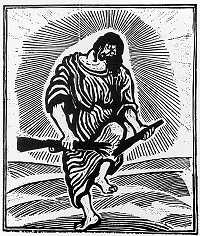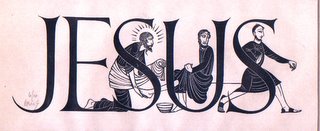
Following the release of the document
Following Jesus, comparisons have been drawn
here and
here with two significant 20th century documents, the
Barmen Declaration and
Message to the South African People (1968). Miss Eagle thanks Steve Hayes of
Notes from the Underground for his dedication in translating the
Message from hardcopy to the electronic world. It is published below:
A MESSAGE TO THE PEOPLE OF SOUTH AFRICA
IN THE NAME OF JESUS CHRIST
WE ARE UNDER AN OBLIGATION TO CONFESS ANEW OUR
COMMITMENT TO THE UNIVERSAL FAITH OF CHIRSTIANS, THE
ETERNAL GOSPEL OF SALVATION AND SECURITY IN CHRIST ALONE
1. WHAT THE CHRISTIAN GOSPEL SAYS
The Gospel of Jesus Christ
Is the good news that in Christ God has broken down the walls of divisionbetween God and man, and therefore also between man and man.
The Gospel of Jesus Christ
declares that Christ is the truth who sets men free from all false hope of grasping freedom for themselves, and that Christ liberates them from the pursuit of false securities.
The Gospel of Jesus Christ
declares that, in the crucifixion of Jesus, sin has been forgiven, and that God has met and mastered the forces that threaten to isolate man and destroy him.
The Gospel of Jesus Christ
declares that, in the resurrection of Jesus, God showed himself as the conqueror and destroyer of the most potent of all forms of separation, namely death, and he proved the power of his love to overthrow the evil powers of fear, envy and pride which cause hostility between men.
The Gospel of Jesus Christ
declares that, by this work of Christ, men are being reconciled to God and to each other, and that excluding barriers of race, nationality, language and culture have no rightful place in the inclusive brotherhood of Christian disciples.
The Gospel of Jesus Christ
declares that God is the master of this world, that his is the mind and purpose that shapes history, and that it is to him alone, and not to any subsection of humanity, that we owe our primary obedience and commitment.
The Gospel of Jesus Christ
declares that we live in the expectation of a new heaven and an new earth in which righteousness dwells; that the Kingdom of God is present already in Christ and through the holy Spirit; and that it therefore now demands our obedience to his commandments and our faith in his promises.
2. Our Concern
This, in summary, is the Gospel of salvation in Jesus Christ. It offers hope and security for the whole life of man; it is to be understood not only in a mystical and ethical sense for the salvation of the individual person, and not only in a sacramental and ecclesiastical sense within the framework of the Church; the Gospel of Christ in a cultural, social (and therefore political), cosmic and universal sense, as the salvation of the world and human existence in its entirety. Further, the Gospel of Christ is not only the object of our hopes; it should be experienced as a reality in the present.
For this reason Christians are called to witness to the significance of theGospel in the particular circumstances of time and place in which they findthemselves. We, in this country, and at this time, are in a situation where a policy of racial separation is being deliberately effected with increasing rigidity. The effects of this are seen in a widening range of aspects of life – in political,
economic, social, educational and religious life; indeed, there are few areas even of the private life of the individual which are untouched by the effects of the doctrine of racial separation. In consequence, this doctrine is being seen by many not merely as a temporary political policy but as a necessary and permanent expression of the will of God, and as the genuine form of Christian
obedience for this country. But this doctrine, together with the hardships which are deriving from its implementation, forms a programme which is truly hostile to Christianity and can serve only to keep people away from the real knowledge of Christ.
There are alarming signs that this doctrine of separation has become, for many, a false faith, a novel gospel which offers happiness and peace for the community and for the individual. It holds out to men a security built not on Christ but on the theory of separation and the preservation of their racial identity. It presents separate development of our race-groups as a way for the
people of South Africa to save themselves. Such a claim inevitably conflicts with the Christian Gospel, which offers salvation, both social and individual, through faith in Christ alone.
This false offer of salvation is being made in this country in the name of Christianity. Therefore we believe that the Church must enable all our people to distinguish between this false, novel gospel and the true eternal gospel of Jesus Christ. We believe that it is the Church’s duty to enable our people to discriminate more carefully between what may be demanded of them as
subjects or citizens of the State of South Africa and what is demanded of them as disciples of Jesus Christ.
3. The Gospel’s Claim
The Christian gospel declares that there is no other name than that of Christ whereby men must be saved. Thus salvation in Christ exposes the falsity of hope of salvation through any other means.
The first Christians, both Jews and Gentiles, discovered that God was creating a new community in which differences of race, nation, culture, language and tradition no longer had power to separate man from man. We are under an obligation to assert this claim and live by it. We are under an obligation to assert that the most significant features of a man are not the details of his genetic inheritance, nor the facts of his ancestry. The most significant features
of a man are the characteristics which enable him to be a disciple of Christ – his ability to respond to love, to make choices, to work as a servant of his fellowmen; these are the gifts of the grace of God at work in the individual person; and to insist that racial characteristics are more important than these is to reject our own humanity as well as the humanity of the other man.
But, in South Africa, everyone is expected to believe that a man’s racial identity is the most important thing about him. Until a man’s racial identity has been established, virtually no decisions can be taken; but, once it is established, it can be stated where he can live, whom he can marry, what work he can do, what education he can get, what hospitality he can accept,
where he can get medical treatment, where he can be buried – and the answer to multi8tudes of other questions can be supplied once this vital fact is established. Thus we are being taught that our racial identity is the final and all important determining factor in the lives of men. As a result of this faith in racial identity, a tragic insecurity and helplessness afflicts those whose racial
classification is in doubt. Without racial identity, it appears, we can do nothing: he who has racial identity has life; he who has not racial identity has not life. This amounts to a denial of the central statements of the Gospel. It is opposed to the Christian understanding of man and community. It, in practice, severely restricts the ability of Christian brothers to serve and know each other, and even to give each other simple hospitality. It arbitrarily limits the ability of a
person to obey the Gospel’s command to love his neighbour as himself.
Attempts have been made to support racial separation from Scripture. For instance, it is said to have the authority of an order of creation, which was divinely confirmed by the confusion of tongues at the Tower of Babel and emphasised again at Pentecost.. The fact is, however, that the event of Pentecost asserts and demonstrates the power of the Holy spirit to draw men into one community of disciples in spite of differences of languages and culture and it is thus the way by which the disunity of Babel is healed.
The Bible’s teaching about creation has nothing to say about the distinction between races and nations. God made man – the whole human race – in his image. God gave man – the whole human race – dominion over the rest of creation. Where differences between people are used as badges or signs of opposing groups, this is due to human sin. Any scheme which is proposed for
the rectifying of our disorders must take account of this essentially sinful element in the divisions between men and between groups of men. Any scheme which is claimed to be Christian must take account of the reconciliation already made for us in Christ. The policy of separate
development does not take proper account of these truths. It promises peace and harmony between the peoples of our country not by a faithful and obedient pursuit of the reconciliation wrought by Christ, but through separation, which, being precisely the opposite course, is a demonstration of unbelief and distrust in the power of the Gospel. Any demonstration of the
reality of this reconciliation would endanger this policy; therefore the advocates of this policy inevitably find themselves opposed to the Church is it seeks to live according to the Gospel and if it shows that God’s grace has overcome our hostilities. A thorough policy of racial separation must ultimately require that the Church should cease to be the Church.
Everywhere, sin corrupts God’s creation, particularly, it exploits differences to generate hostility. The policy of separate development is based on the domination of one group over all others; it depends on the maintenance of white supremacy; thus it is rooted in and dependent on a policy of sin. The Christian Gospel declares that God has acted to overthrow the policy of sin.
God is bringing us from a living death to a new life; and one of the signs that this has happened is that we love the brethren. But, according to the Christian gospel, our ‘brethren’ are not merely the members of our own race-group, nor are they the people with whom we may choose to associate. Our brother is the person whom God gives to us. To dissociate from our brother on the grounds of natural distinction is to despise God’s gift and to reject Christ.
The Gospel of Jesus Christ declares that God is love. This is not an easy doctrine. It is not ‘sentimental humanism’. It is far easier to believe in a god who is less than love and who does not require a discipleship of love. But if God is love, separation is ultimately the opposite force to God. The will to be separate is the most complete refusal of the truth. The life of separation is the most plain denial of life. The Christian Gospel declares that separation is the supreme threat and danger, but that in Christ has been overcome. According to the Christian Gospel, we find our identity in association with Christ and with each other. Apartheid is a view of life and a view of man which insists that we find our identity in dissociation and in distinction from each other. A policy of separate development which is based on this concept therefore involves a rejection of the central beliefs of the Christian Gospel. It calls good evil. It rejects as undesirable the good reconciliation and fellowship which God is giving to us by his Son. It seeks to limit the limitlessness of God’s grace by which all men may be accepted in Jesus Christ. It seeks to confine the operation of God’s grace within the barriers of human distinctions. It reinforces
divisions which the Holy Spirit is calling the People of God to overcome. This policy is, therefore, a form of resistance to the Holy Spirit.
3. Our Task
People should be able to see the Gospel of Christ expressed in the life of theChurch. They should be able to see in the Church an inclusive fellowship anda freedom of association in the Christian brotherhood. They should be able to see the power of god at work in the Church changing hostility into love of the brethren. We are indeed thankful for these signs of God’s grace where they are to be seen in the life of the Church. But, even in the life of the Church, there is conformity to the practices of racial separation; and the measure of this conformity is the measure of the Church’s deviation from the purpose of Christ.
Our task is to work for the expression of God’s reconciliation here and now. We are not required to wait for a distant ‘heaven’ where all problems will have been solved. What Christ has done, he has done already. We can accept his work or reject it: we can hide from it or seek to live by it. But we cannot postpone it, for it is already achieved. And we cannot destroy it, for it is the work of the eternal God.
4. We must obey God rather than men
The gospel of Jesus Christ declares that Christ is our master, and that to him all authority is given. Christians betray their calling if they give their highest loyalty, which is due to Christ, to one group or tradition, especially where that group is demanding self-expression at the expense of other groups. Christ is the master and critic of all of us and all our groups. He is the judge of the Church also. If the Church fails to witness for the true Gospel of Jesus Christ it will find itself witnessing for a false Gospel. If we seek to reconcile Christianity with the so-called ‘South African way of life’, (or any other way of life) we shall find that we have allowed an idol to take the place of Christ. Where the Church thus abandons its obedience to Christ, it ceases to be the
Church; it breaks the links between itself and the Kingdom of God. We confess, therefore, that we are under an obligation to live in accordance with the Christian understanding of man and community, even if this be contrary to some of the laws and customs of this country.
Many of our people believe that their primary loyalty must be to their group or tradition or political doctrine, and that this is how their faithfulness will be judged. But this is not how God judges us. Indeed, this kind of belief is a direct threat to the true salvation of many people, for it comes as an attractive substitute for the claims of Jesus. It encourages a loyalty expressed in self-assertion: it offers a way of salvation with no cross. But God judges us, not by our faithfulness to a sectional group but by our willingness to be made new in the community of Christ. We believe that we are under an obligation to state that our country and Church are under God’s judgement, and that Christ is inevitably a threat to much that is called ‘the South African way of life’. We must ask ourselves what features of our social order will have to pass away if the lordship of Christ is to be fully acknowledged and if the peace of God is to
be revealed as the destroyer of our fear.
But we believe that Christ is Lord, and that South Africa is part of his world. We believe that his kingdom and its righteousness have power to cast out all that opposes his purposes and keeps men in darkness. . We believe that the word of God is not bound, and that it will move with power in these days, whether men hear or whether they refuse to hear. And so we wish to put to every Christian person in this country the question which we ourselves are bound to face each day; to whom, or to what, are you giving your first loyalty, your primary commitment? Is it to a sub-section of mankind, an ethnic group,a human tradition, a political idea, or to Christ?
May God enable us to be faithful to the Gospel of Jesus Christ; and to be committed to Christ alone!
************************************************
“A Message to the People of South Africa” is the work of the Theological Commission of the South African Council of Churches, and its publication is authorised by the Council.
The Biennial Meeting of the Council resolved “that individual Christians be invited to sign the document as an expression of their Christian commitment and that member churches of the Council be invited to give it serious consideration”. If individuals or groups sign copies of the Message as an act of identification with it, it would add to the significance of the act if the South African Council of Churches was informed. Further copies may be obtained from the Council at 10 cents per copy, or 50cents per 10 copies.
The Message is offered as a basis for study and action. Some may like to read it aloud in Church groups or to congregations and distribute copies to members of parishes.
The next task of the Theological Commission of the South African Council of Churches is to develop in greater detail the significance of the paragraph ‘Our Task’, and to work out the practical implications of this statement of faith for both Church and society.
****************************************
Notes
What follows here is not part of the Message to the People of South Africa, but is an explanatory note about the background to the document.
This electronic version is being made available since the Message was an influential historical document, and forms part of the history of Christianity and the struggle against apartheid in South Africa. It was part of Christian history in a particular time and place, and thus may be useful to students of church history. It may also speak to Christians in other times and places who are trying to witness to the truth of the Gospel in the societies in which they live.
The Message was released in the middle of 1968, and was one of the first public acts of the South African Council of Churches, which had grown out of the Christian council of South Africa. It was preceded by a theological conference on Pseudogospels and some of the wording in the Message came from papers read at that conference.
A Biblical Commentary on the ‘Message to the people of South Africa’ by the Revd John Davies, Anglican chaplain of the University of the Witwatersrand, was published and distributed by the Christian Institute of Southern Africa.
There was also a 64-page book, The “Message” in perspective, which had press editorials, church statements and articles on the theological issues raised by the Message.
In this electronic version, I have tried to correct obvious typos and misspellings (“thaat” instead of that, “me” instead of “be”), though I may have introduced a few of my own for which I must accept responsibility.
This electronic version typed and distributed by
Deacon Stephen Hayes
shayes@dunelm.org.uk
Tuesday, 09 May 2006
If you wish to suggest/submit documents
which meet the three criteria laid out in Following Jesus - 2
please email Miss Eagle on the sidebar.




 Non-violent Jesus
Non-violent Jesus